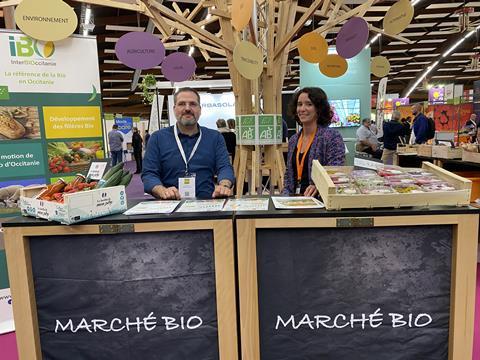Supermarket saw biggest sales decline after shrinking their organic ranges in response to changing consumer behaviour

The French market for organic fruit and veg is growing again after a challenging couple of years when supermarkets scaled back their ranges and consumers tightened their purse strings due to high inflation.
Emmanuel Eichner, the vice president of organic trade body Interbio Occitanie, told Fruitnet that the market had started to pick up in the past five to six months, driven by the easing of inflation from 10.5 per cent in 2023 to 1.5 per cent in 2024.
According to Kantar Worldpanel data published by fresh produce trade association Interfel, volume sales of organic fruit in France fell by 1.4 per cent in 2024, while organic vegetables saw a 0.2 per cent volume rise. However, compared to the 2021-23 average, 2024 volumes were down by 9.5 per cent in fruit and by 10.5 per cent in veg.
This was partly driven by a marked decline in penetration, which fell from 84.2 per cent in 2020 to 77.4 per cent in 2023. Thankfully, this downward trend started to reverse in 2024, with penetration inching up to 77.9 per cent.
Meanwhile, the 2024 market share for organic fruit and veg remained stable at 6.7 per cent in volume and 7.9 per cent on volume.
Eichner noted that inflation in the organic fruit and vegetable sector had been slower than in conventional produce, but he acknowledged that the higher price of organic fresh produce had affected demand as shoppers adapted their shopping behaviour to reduce grocery spending.
French supermarkets responded by reducing their range of organic lines, by 8.7 per cent in the first half of 2024, causing some shoppers to exit the category.
Meanwhile, specialist stores and direct sales have grown, with shoppers seeking out a more extensive offer.
Eichner says he is confident the organic sector will continue to recover in France as the financial pressures on consumers ease.
However, some producers have decided to exit the organic sector in the past couple of years, including at French apple cooperative Cofruit d’Oc, which has scaled back its organic production due to problems with profitability.
In February, Agence Bio launched a campaign called ‘C’est Bio La France!’ (or ‘France is organic!’) to position organic produce at the heart of French culinary culture and the country’s love of ‘la bonne bouffe’ (good food).
Among other things, the campaign aims to help increase the percentage of French agricultural land used for organic food production from 10 per cent to 18 per cent by 2027, as outlined by the French government last May in its Ambition Bio 2027 programme.
Eichner also stressed the need for marketing campaigns to explain to consumers how organic fruit and vegetables are actually produced, with many consumers wrongly assuming that organic production involves no crop treatments of any sort.
He added that the proliferation of sustainable production labels in France continues to confuse consumers, making it harder for organic produce to stand out.
Meanwhile, Nordine Arfaoui of organic co-op Uni-Vert argued that alternative labels such as ‘Zero Pesticide Residue’ have muddied the waters, effectively putting conventional produce in competition with organic.
“If the conventional works well, organic will work well too,” he said. “We have to move forward together. We need to have a truthful discourse with the consumer.”



